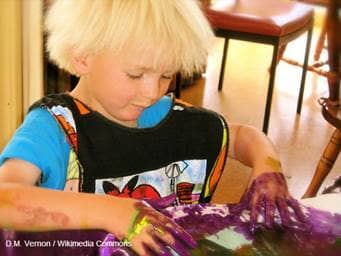
Child prodigies could share a genetic trait with children that also have autism. A study published in 2015 found that the DNA from children with incredible abilities in the arts, sports, science, math, and music had autism in the family. As reported by PBS News Hour, prodigies and people with autism both peaked on chromosome 1.
“It was like, here it is, here’s the autism and the prodigies together and they have a significant peak on chromosome 1, where they are significantly different than their non-affected family members,” Joanne Ruthsatz of Ohio State University said in the interview. This finding suggests that a locus on chromosome 1 increases the likelihood of both prodigy and autism in these families.”
But what is a prodigy?
A prodigy is defined as a child under the age of 10 who has mastered skills in music or other fields at a mind-blowing rate without professional training. Wolfgang Amadeus Mozart was a toddler when he composed music and preformed in front of royalty. Mozart had autism, and many others. Scientist Temple Grandin, actress Daryl Hannah, actor Dan Aykroyd, and singer Susan Boyle have autism.
They all share a trait of uncompromising talent. What can we learn from prodigies that could help us understand autism? Prodigies teach us to live in the moment. They have a passion for their craft that drives them to work over night on a project without recourse.
The importance for the rest of us is to encourage this talent and help harness it.
“I had people in my life who didn't give up on me: my mother, my aunt, my science teacher. I had one-on-one speech therapy. I had a nanny who spent all day playing turn-taking games with me,” Dr. Temple Grandin said.
Attention to detail is another thing we can learn.
People with autism have a good memory and have a great attention to detail. This independent thinking can also hinder them as they are solely focused on a task or subject. Dr. Joanne Ruthsatz said in an interview with the HuffPost that some of the traits seen in autism are seen as negatives. This is not really the case.
“But for child prodigies, they’re strengths. It’s attention to detail, extraordinary memories, an over-representation of autism in their families, and a “rage to master,” they become intensely involved in whatever particular domain they’re in. We have one highly prolific prodigy who has a highly autistic brother. So where does the hair split? What’s the difference there? Why did one turn out to be a prodigy and the other to have severe autism?”
Prodigies need to be perfect and strive for excellence and could lack patience to attain what they want. Patience is a must for people for people who have relationships with those with autism. It pushes you to the maximum and it allows us to dig deeper within to understand them better. They both have a great memory Ruthsatz found in her research.
“What was consistently extraordinary, however, was the child prodigies' working memory scores—a category in which every prodigy tested in the 99th percentile. Additional results suggest a previously unknown connection between child prodigies and autism. The prodigies' family histories yielded an unlikely number of autistic relatives. And the child prodigies received elevated AQ scores [Autism-Spectrum Quotient] with respect to attention to detail, a trait associated with autism.”
There is another necessary aspect as we compare prodigies to people with autism--that is one of hope, love, and embracing the unknown by moving forward despite fears and lack of understanding.
“Hope is the greatest thing for moms of autism. Hope is what gets us out of bed in the morning. I'm on a mission to tell parents that there is a way,” - Actress/Author Jenny McCarthy.

